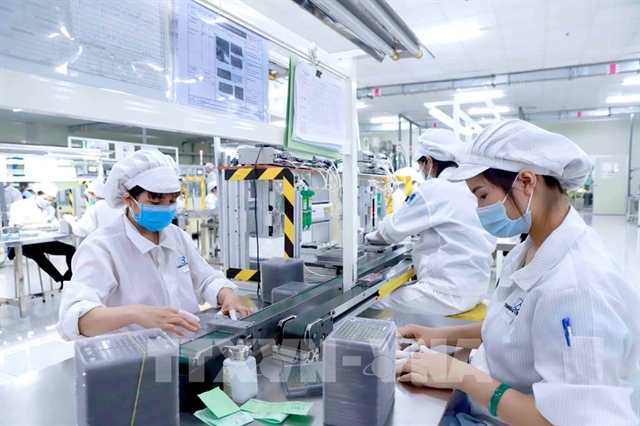 Economy
Economy


|
| Workers at an electronic maker factory in the Bình Xuyên Industrial Park in the northern province of Vĩnh Phúc. — VNA Photo |
HÀ NỘI —The pandemic has hit Việt Nam harder than previously anticipated and recovery will likely be slow.
Strong and effective measures are needed in the last quarter of 2021 and the beginning of 2022 to check the spread of the virus and to address the country's numerous economic bottlenecks, according to the National Centre for Socio-Economic Information and Forecast (NCIF) under the Ministry of Planning and Investment (MPI).
"The pandemic has also exposed shortcomings and limitations in Vietnamese firms' management capacity and the ability to absorb and adapt to disasters," said Trần Toàn Thắng, NCIF's senior official at the Viet Nam Economic Pulse (VEP) - a semi-annual forum analysing trends and exploring emerging issues in economics and policymaking - held yesterday in Hà Nội.
Thắng said the fourth virus outbreak has severely disrupted Việt Nam's socio-economic activities, especially in major industrial hubs in the north and the south. It has resulted in the MPI's recent forecast for economic growth this year capped at 1.5-2 per cent in the best-case scenario.
The worst-case scenario, according to the MPI, was at 0.8 per cent if the country failed to rein in the virus. A more optimistic outlook for 2022 was shared by the MPI, which projected Việt Nam's 2022 GDP growth at 5.8-6.7 per cent.
Economists continued to urge the government to speed up vaccination and double down on virus control. Meanwhile, urgent and meaningful measures must be taken to support the business community.
Võ Trí Thành, former deputy head of the Central Institute for Economic Management, said the government's mission objectives during the pandemic included carrying out economic reform and restructuring, implementing policies to attract greater and high-quality FDI and speeding up the digitalisation process.
Jonathan Pincus, a senior economist from the United Nations Development Programme (UNDP), said it was time Việt Nam starts restructuring its financial institutions. The country must also form new bodies to provide long-term financial support for the development of infrastructure and national competitiveness.
Pincus said if Vietnamese firms failed to compete on their home turf and on an international level it's unlikely the country would see improvements in saving and investment.
Việt Nam's long-term goals should focus on raising labour productivity and improving the business environment. Post-pandemic economic recovery should be considered and utilised as an opportunity to restructure, to roll out radical policy changes and adjustments to government management of the economy.
Another key area is speeding up public investment, especially digital infrastructure and digitalisation projects.
The forum this year highlighted the developments in international finance in the wake of COVID-19 and opportunities for Vietnamese firms to leverage global value chains to raise productivity and profits. — VNS




